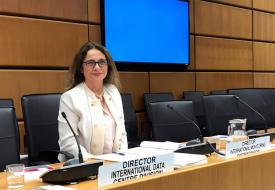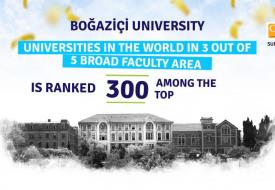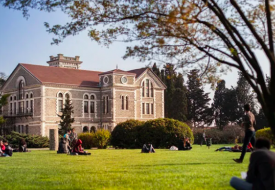Academician, author, documentary producer Lisa Gilman teaches at Summer School
Could you introduce yourself shortly, your education and academic background, your studies etc?
I am professor of Folklore at George Mason University in Fairfax, Virginia in the U.S. The university is in the greater Washington DC area. I have a PhD in Folklore with a minor in African Studies from Indiana University in Bloomington, Indiana (USA). I have been teaching courses in folklore, ethnographic research methods, gender studies, and African studies for the past twenty years. Much of my research focuses on folklore/culture, gender, and politics in Southern Africa (mostly Malawi and more recently Zambia). I have also done research in the U.S. with military veterans of the wars in Iraq and Afghanistan.
How did you decide to give a course in Boğaziçi University this summer term? Have you ever had any contact before with Boğaziçi Universıty or with Turkey or is it your first time in here?
This is my first time in Turkey and first opportunity to work with Boğaziçi University. I learned about this opportunity last fall. I was giving a guest lecture at Indiana University. Boğaziçi History Professor Dr. Arzu Ozturkmen happened to be spending a month at Indiana University during her sabbatical. After my talk, she suggested that I submit an application to teach for the summer program. I had never been to Turkey and thought it would be a wonderful opportunity to not only teach in another country but also expand my knowledge and research interests in intangible cultural heritage to a new part of the world. I am also looking forward to developing stronger relationships with my Turkish colleagues and exploring opportunities for future collaborations.
Intangible cultural heritage is one of your research areas. Could you explain us about this term ‘’intangible cultural heritage’ and could you give some info about the content of your course in Boğaziçi?
Intangible cultural heritage refers to cultural forms and practices that groups of people consider to be very important to their groups. They include such things as oral tradition/stories, food, dance, music, games, festivals, and holiday celebrations. These types of cultural forms are integral to social life for all people in all social/cultural contexts. People use these forms to accomplish many important social, cultural, economic, and political objectives, such as identify with one another, connect with the past, identify with places, communicate, educate, entertain, transfer knowledge, negotiate conflict, make money, etc. We know that culture is dynamic and is always changing. Yet, many people are concerned that globalization and other factors are contributing to the loss of community-based intangible cultural heritage. These concerns have precipitated efforts by local communities, NGO’s, national governments, and international bodies to try to preserve or safeguard such cultural forms. This course considers what is meant by “intangible cultural heritage,” how is it valued by different constituents, how it relates to tangible heritage (such things buildings and artifacts), the motivations and outcomes in efforts to “preserve” culture, and some of the issues that are associated with these efforts.
Besides cultural heritage you are also interested in digital storytelling, trauma and gender areas. Could you give us info about your researches in those areas ?
I have conducted research on many different topics. The broad question that drives much of my research is how people on the ground—at lower echelons of social and political hierarchies—use artistic forms in their experience and response to the power systems in which they exist. My book The Dance of Politics: Gender, Performance, and Democratization in Malawi used women’s political dancing as an entry point for exploring how poor women in Malawi participate in politics, and how their marginalization within the political culture contributes to their economic and political subordination. For my book My Music, My War: The Listening Habits of U.S. Troops in Iraq and Afghanistan, I researched how U.S. troops use music at war in order to shed light on the experiences of those on the ground fighting wars (not the decision-makers) and the impacts of war on individuals. For this project, I was also particularly interested in gender and how ideals of masculinity shape troops’ identities and experiences and also greatly impact their experiences with combat trauma.
In my teaching and research, I am also interested in developing how to produce research products that expand audiences outside of other the typical academic audiences. Producing documentaries, training students in digital storytelling, and teaching courses in public folklore and teaching field schools are part of this objective.
You have also produced the documentary Grounds for Resistance about the anti-war activism of U.S. veterans of the Iraq and Afghanistan wars. How this documentary was realized and is there any possibility to access it?
I became interested in this documentary while working on the My Music, My War project mentioned above. While doing research on music, I met some very young veterans of the Iraq and Afghanistan wars who had become activists against these wars and had started a non-profit coffee shop to provide support for military troops and their families and organize their activism. I found what they were doing to be very compelling and so took a few years to do research with them and make this documentary. I have brought some copies of the film with me to Turkey. Dr. Öztürkmen has suggested that we organize a screening while I am here.










